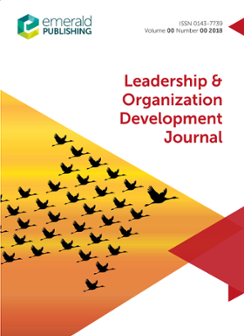Table of contents
How do leaders' positive emotions improve followers' person–job fit in China? The effects of organizational identification and psychological safety
Chongrui Liu, Cong Wang, Hongjie WangAlthough a plethora of literature has developed person–job fit theory, how leaders' emotions affect followers' person–job fit has received insufficient attention. Drawing on…
On the motivational nature of authentic leadership practices: a latent profile analysis based on self-determination theory
Julie Levesque-Côté, Claude Fernet, Alexandre J.S. Morin, Stéphanie AustinAlthough one of the central premises of authentic leadership theory is that authentic leaders mobilize their followers, the underlying motivational mechanisms of this process…
Knowledge hiding as the dark side of competitive psychological climate
Myat Su Han, Khola Masood, Dan Cudjoe, Yonggui WangPrevious studies suggest that competitive psychological climate at workplace may influence employee's attitudes and behaviors. The purpose of this paper is to explore whether…
Impact of Big Five personality traits on authentic leadership
Khurram Shahzad, Usman Raja, Syed Danial HashmiThe bulk of the current research on authentic leadership focuses on the examination of its consequences. Little attention has been paid to the predictors of authentic leadership…
The impact of ethical leadership on employee creative deviance: the mediating role of job autonomy
Xiaoqin Liu, Yevhen Baranchenko, Fansuo An, Zhibin Lin, Jie MaThis study aims to explore the impact of ethical leadership on employee creative deviance, with job autonomy as a mediator and creative self-efficacy as a moderator between job…
How exploitative leadership influences employee innovative behavior: the mediating role of relational attachment and moderating role of high-performance work systems
Zhining Wang, Chuanwei Sun, Shaohan CaiThe purpose of this research is to examine the relationship between exploitative leadership and employee innovative behavior and explore the mediating role of relational…
Leader–member exchange, employee turnover intention and presenteeism: the mediating role of perceived organizational support
Ing-Chung Huang, Pey-Lan Du, Li-Fan Wu, Jennet Achyldurdyyeva, Li-Chang Wu, Chih Seng LinThe purpose of this paper is to report the findings of a study that examines the influence of leader–member exchange (LMX) on employees' turnover intention and presenteeism with…
The role of leadership and engagement in call center performance: answering the call in Peru
Rachel Gabel Shemueli, Mary F. Sully de Luque, Danae BahamondeTo examine the effects of leadership style on in-role performance through feedback seeking behavior (FSB) and engagement using the job demands resource theory (JD-R).
A two-nation investigation of leadership self-perceptions and motivation to lead in early adulthood: the moderating role of gender and socio-economic status
Thomas Hoyland, Alexandros Psychogios, Olga Epitropaki, Jonathan Damiani, Sumona Mukhuty, Chris PriestnallDrawing on the social-cognitive and motivational literature of leadership, the present study examines the influence of young adults' self-perceptions of leadership on their…
Be like me: the effects of manager–supervisor alignment
Johanna Anzengruber, Sabine Bergner, Herbert Nold, Daniel BumblauskasThis study examines whether managerial capability fit between line managers, middle managers and top-level managers enhances effectiveness.

ISSN:
0143-7739Online date, start – end:
1980Copyright Holder:
Emerald Publishing LimitedOpen Access:
hybridEditors:
- Professor Martin McCracken
- Prof Paul Humphreys